Dear Avinash: Web Metrics & Analytics Questions, Facebook Edition
 A few weeks back I had asked this question on Twitter: Inspire me: If there is one web analytics question you want answered what would it be? What's your juiciest / mundane, daily, challenge?
A few weeks back I had asked this question on Twitter: Inspire me: If there is one web analytics question you want answered what would it be? What's your juiciest / mundane, daily, challenge?
The result was this post: Top Web Analytics Questions, Twitter Edition.
Those 16 questions (!) were just one part of the story.
My twitter account is linked to my facebook account , so my tweets get posted as my status updates.
That means I got a bunch of questions on the facebook account as well. . . .
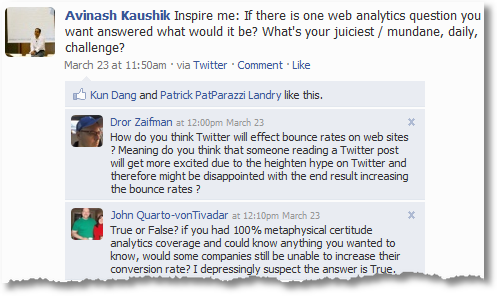
Here is a summary of the 9 questions / topics that are addressed in this blog post:
- Twitter's impact on bounce rates.
- Does complete information translate into absolute action?
- The most important business questions addressed by Web Analytics.
- How to judge someone's talent/ability in being a Web Analyst?
- The mystery of "Returning Visitors" having 1 Visit to Purchase! <- Important.
- Reliability, and effectiveness, of Predictive Web Analytics.
- How to measure impact of Branding activities?
- Metrics / Key Performance Indicators to check Daily (!), for any site (!!).
- Tips and best practices for Filters and Expressions in Google Analytics.
So here we go, replies to my facebook friends, things that keep them up at night. . . .
#1: Dror Zaifman:
How do you think Twitter will effect bounce rates on web sites ? Meaning do you think that someone reading a Twitter post will get more excited due to the heighten hype on Twitter and therefore might be disappointed with the end result increasing the bounce rates?
 Twitter will no more increase your bounce rates than say a digg or a stumbleupon or pick your favorite "hot right how" web 2.0 thingy .
Twitter will no more increase your bounce rates than say a digg or a stumbleupon or pick your favorite "hot right how" web 2.0 thingy .
In the sense that each of these channels tends to bring new traffic to your site, perhaps a higher percent of them might not be totally relevant for you. But I am not sure that the traffic from Twitter has any higher levels of ADD. :)
As to weather they should be disappointed or not, that's your call. If you/others just use Twitter to hype what you do or push sub optimal content then you lose credibility, followers and more. So the system is "self correcting".
#2: John Quarto-vonTivadar:
True or False? If you had 100% metaphysical certitude analytics coverage and could know anything you wanted to know, would some companies still be unable to increase their conversion rate? I depressingly suspect the answer is True. Remember I am not a rocket scientist. You need to dumb this down for me! :)
Let me rephrase John's question (he is a rocket scientist!): Even if we had all the data in the world would some companies still stink beyond belief in their ability to improve conversion rate?
I am afraid the answer, as John predicted, is a depressing True.
This is not a data problem. It is a people problem. Or perhaps better put it is an Organization Behavior problem.
 I think most of the time we underestimate two things:
I think most of the time we underestimate two things:
1] Data is just data and you need to invest in analysis (and hence people) and most companies just want tools (or as you put it "acquire the solution"). At some point tools will move from simply puking data to giving insights with no human requirement. That day is not today. Or tomorrow. Or 2010.
2] It takes a lot to get over oneself (in this case the HiPPO's), we can present data and win arguments yet people have deeply entrenched opinions that they are unwilling to set aside to actually implement what the data says. And of course I am not even going to touch on politics and solving for vested personal interests.
For example I am dealing with someone now who is doing the worst possible thing for the long term simply because he/she can get a promotion in the short term. And that's not even the worst of the problems that "data" has to deal with every day.
Result: Lower Conversions.
Sad.
#3: Eric Werner:
What are the most common important business questions addressed by web analytics? – I find that a lot of marketing managers who are newly introduced to analytics say this is great – so what should I measure? I tell them it depends on the business questions they want answered and then they ask what questions should I want answered?
The single greatest root cause of failure with web analytics is the unwillingness or inability to understand what the site is trying to do, and hence defining goals.
While the real answer to your question is: it depends, let me try to see if I can help.
First tell them that Web Analytics can help measure three specific Outcomes from a website (more in the twitter analytics post):
1] Increased Revenue.
2] Reduced Costs.
3] Improved Customer Satisfaction/Loyalty.
Your question to them is: "Which of these are you working on? I can help you measure each or all of these if you tell me what you are doing."

That should help focus them a bit and secondly get you started with the most perfect start in Web Analytics: Tying numbers to Outcomes (leads, conversions, loyalty, phone calls, downloads, whatever).
If they refuse to tell you which of the above they are solving for. . . first submit your resume at Monster.com and start looking for a job, the company you are working for is going down. . . then tell them that web analytics can help answer these questions:
Q1: What is the intent that is driving people to our websites?
[Use the search keywords report, and internal site search.]
Q2: How do people find our websites?
[Use your referring url's reports.]
Q3: How many people land on our site, puke on it, and leave right away?
[Use your bounce rate data, for site, keywords and ref urls.]
Q4: What content do people consume on our website?
[Use your content reports, top content, plot a head and tail curve, that will get you a big hug!]
Q5: What calls to action, navigational elements do people engage with on our pages?
[Use the site overlay report, for your top 10 most viewed pages.]
Q6: Where are you spending money inefficiently?
[Use the campaigns reports, focus on where your company / Marketers are spending money right how: Search, Email, Affiliates....]
Q7: Are we making money? Reducing cost? Increasing Customer loyalty?
[Sorry could not resist, I had to hammer this in again, it is so important you measure this.]
Hope this helps Eric. More on this post if you are interested: Tips for Web Analytics Success for Businesses.
#4: Tal Galili:
How can you (and where can't you) quantify a persons talent/ability in being a web analyst? How could I judge my own performance as a web analyst?
I look for:
1] Critical Thinking
(Interviewing Tip: Stress Test Critical Thinking. Please.)
2] Business Experience
(If all they have is button pressing / report publishing experience they might be very young in their career and that is ok, but if not I am looking for people who have business / marketing / finance experience, if they are a Marketer they get bonus points from me.)
3] High EQ (emotional quotient)
(Wikipedia: The ability, capacity, a self-perceived ability, to identify, assess, and manage the emotions of one's self, of others, and of groups. Me: One person, no matter how high on the IQ scale can rarely change organizations alone.)
4] Flexibility in thinking, an openness to new information.
(You might think this is obvious, who is dumb enough to stay dug in when faced with new information. You'll be surprised. I also look for people whose core thinking is not rigid, they realize the world is not perfect, they realize data is incomplete, they realize web Analytics, as in clickstream, is not panacea.)
5] Knowledge Seekers
(I mentioned in a recent interview that I spend three to four hours a week learning something new about our field. Trying new tools. New types of analysis. Reading non-pompous-only-theory-gossip blogs that share new methods of thinking. Attending free webinars in broad fields. I feel I am not doing enough. Find people that invest atleast that much a week.)
If you are doing these things I think you are on the right path. Certainly learn to use more tools and what not. But enrich your mind, keep it open and flexible, think like a marketer.
Good luck Tal.
#5: Robert Patterson:
Can you please explain how the Visits to Purchase Google Analytics report segmenting new and returning visitors can show returning visitors making a 1 visit purchase? Wouldn't that make them a new visitor purchase and not a returning visitor purchase?
Robert's question is one of those that you dig into and discover something deeply sub optimal. I am especially sad because this is one of my favorite pan session report.
Here's what Robert is asking:
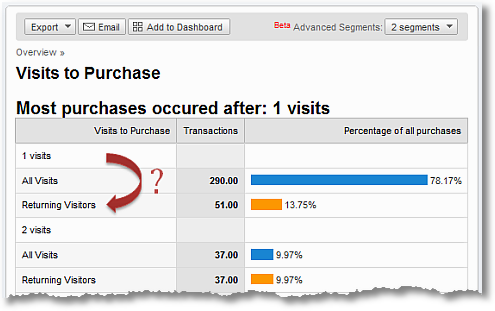
See that red arrow? If someone is a "Returning Visitor" why would the report say they purchased after one visit?
Why do you think that is?
Think about it….
Take a guess….
Aw come one…..
I'll give you one more try…. come on Justin you know this one….
Got the answer?
Its not what you thought.
This report is wrong in Google Analytics. Well that's not entirely right. Technically the label on top of the report is wrong. And what it actually measures then makes it useless.
I am getting ahead of myself.
What this report actually measures is: Visits to Purchase from the last Campaign.
Only it does not say that either in the label or in the in page help.
Take three scenarios:
Angie: Visit from paid search campaign. Direct Visit. Visit from email campaign -> Purchase.
What the report shows: Visits to Purchase: 1. (See how Angie is a returning visitor? Yes.)
What a correct report would show: Visits to Purchase: 3.
Jennifer (Angie's bff): Paid search visit. Direct visit. Organic visit. Bookmark visit. Direct visit. Direct visit -> Purchase.
What the report shows: Visits to Purchase: 3.
What a correct report would show: Visits to Purchase: 6.
Judith (Angie's part of the time bff): Affiliate visit. Direct visit. Bookmark visit. Direct visit -> Purchase.
What the report shows: Visits to Purchase: 4.
What a correct report would show: Visits to Purchase: 4.
In summary, Google Analytics will only count the number of visits after a campaign (and campaigns in GA are email, affiliate, paid search, organic search,.. literally everything except direct/bookmark) and show that on this report.
That means this report, another one I love, is also wrongly labeled:

The correct label for this is Days to Purchase from the last Campaign.
I am sure the team at Google will fix the label.
The challenge of course is that while the name change will mean the report will have the right description, it will essentially be useless.
Just look at the above three scenarios. If they are all in the Days/Visits to Purchase from the Last Campaign what actionable insight do you get?
You are still ten million miles away from understand how long does it take for someone to convert.
The fix is not a change in the label, the fix is scraping the report and actually creating a real Days to Purchase and Visits to Purchase reports. If I want to know how many days/visits it takes someone to convert from a organic or paid or email campaign I can always segment that data and view the clean report. Here I don't even know what the "last campaign" was.
Sorry Robert. And to all of you as well.
#6: John Stansbury:
Based on performance through yesterday, how reliably can I predict where we'll end up EOD today? (Initial promising results using Holt-Winter adaptive forecasting, but time- and effort- intensive.) Additionally, how granular is too granular for actionable analysis? Is that determined by the agility of your site to adapt?
I wish there was a easy answer to this, sadly no.
Both your questions can be very specific to the business, the goals of the website, seasonal factors unique to you, the overall business strategy (and sub components of that applied on the web), yada, yada, yada.
But regardless of your business you'll face these six challenges in your attempt to do "predictive analytics" on your web data:

All the details are in this post: Data Mining And Predictive Analytics On Web Data Works? Nyet!
As to your second question, how granular is too granular for actionable analysis, you'll typically work with a portfolio. As you execute your analysis train yourself to recognize when you are reaching the point of diminishing margins of return. Then you stop, move on to the next thing.
More in this post, see #3: Bounces, Abandonment, Visitor Ratios & Data Drops!
One last tip, always seek to balance what you can do (analysis/insights) with what your company/site/HiPPO can actually action. What they can action might not be the top nine powerful actionable high impact things, they could only do ten through fifteen. Then forget the top nine.
Sucks. I know.
#7: Martin Leblanc:
How do you measure the effect of branding activities?
This is a complicated issue and I might not do it complete justice in a short reply, but let me outline some broad brush strokes.
I believe that branding is a worthy Marketing goal. It gets people to associate, hopefully, positive attributes with your products and services. Here's one of the masters at branding:

Abercrombie & Fitch . The image above is not their website, it is their complete email campaign. The minor text at the bottom is the opt-out and their address. No call to action (!).
It certainly evokes an emotional reaction, perhaps a brand attribute they would want associated with them.
Measurement?
I firmly believe that every marketing activity has to drive outcomes. It can drive it now, it can drive it in 30 days, it can drive it in six months.
I believe that if you do "branding" you need to define an outcome, increased store sales, more people to the site, more leads for a future concert, newspaper stories from your out of the world campaign, something else.
If there is an outcome you can measure it. My favorites for measuring impact from branding campaigns, for the web:
- Increased Visitor Loyalty and Recency measures post campaign.
- If related to a product, increased sales (even if latent conversions).
- Improved "likelihood to recommend" scores, during / post campaign, as measured by exit surveys.
My favorite way to measure impact of branding campaigns is to do rigorous controlled experiments. They can prove anything, trust me.
For more on this check out #6 here: Multi Channel Analytics.
#8: Claire Devereux Thompson:
I have to check many client sites every day to make sure that things are going smoothly – what's the one thing that I need to look at if I only have a minute for each?
I was stumped so asked Claire for a bit more.
Claire clarified (say that five times :) that her clients include non-profits that use the web to raise money, a small art school, a large regional furniture site, a online only gift store.
I am still stumped!
The real answer of course is: It Depends.
Fat good that does Ms. Thompson. So let me try to pull a rabbit out of the hat.
My first stab at this would be to look at Outcomes (Goals).
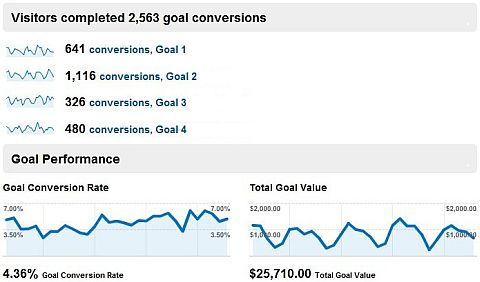
The above data is for a non-ecommerce, not for profit website. It has four goals, and for each quantified goal values.
It is easy to see daily progress (if that's important), certainly weekly, by looking both at the sparklines next to each goal and also the two sweet numbers at the bottom.
Bottom line: Bottom line is important. Ask each biz to do this, add it to your dashboard. [Ideas for goals for different sites here: Measure Macro AND Micro Conversions.]
My second bunny, sorry tip, would be to focus acquisition, and the idea of the What's Changed Report.
After you install the Enhanced Google Analytics plugin from our friends at Juice Analytics you'll be able to something like this:
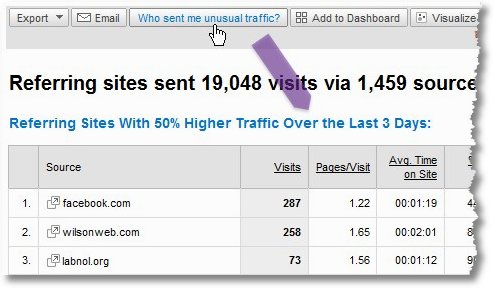
In your referring sites report you can click on the Who sent me unusual traffic? button and it will show you sites that have increased by 50% in traffic, or dropped 50%.
In the Keywords report you'll see the same thing but with search keywords.
Both help you get away from the top 10 reports, that rarely change, and help you identify big shifts in keywords and referrers which should in turn help you know if something needs your attention.
I hope the above two sets of ideas help, but what I want you to focus more on is the philosophy I am advocating: 1) Start with Outcomes, always. 2) Focus only on what changes, that mining will help find gems.
Oh and it is a bit of work, even every day. No insight worth monetizing is ever free. Hmm… that's pretty profound. No? :)
#9: Robert Kennedy:
How to get the most out of your filters/ expressions in Google Analytics. I am always pushing that angle of analytics, sometimes I mix up some wild concoctions :). Seems you are only limited by knowledge and imagination with no floor or ceiling. What is the best resource for filters and expressions?
Can I fess up that I never use them, mostly because perhaps I am not doing the same kinds of analysis.
There is one other reason. I have this constant hyper filter on: what's the marginal value of me digging a bit more, doing this fancy filters/expression magic?
 For me Advanced Segments suffices most of the times.
For me Advanced Segments suffices most of the times.
All that said three resources for you:
- Robbin "I am the queen of GA expressions" Steif: Regular Expressions Part XII: Bad Greed. Yes that's part 12!
- EpikOne's Regular Expression Filter Tester. Its really good for QA'ing things before you put them in the wild.
- Not owing Justin Cutroni's Google Analytics Short Cuts book is now considered a felony in 49 states (all except Utah for some reason). So get it!
I think that should get you going Robert, perhaps it is time for you to start tweeting your favorite expressions and filters? :)
There you go, nine questions that were top of mind for people who ran into my request for inspiration on Facebook.
These are very broad and complex questions, very difficult to answer in a short Q&A, but I hope you all find the answers to be be of some value.
Ok now your turn.
How would you have answered any of these questions differently? Did I miss something in one of the answers? Agree, disagree, shout with joy, cry with pleasure. . . do please share your thoughts.
Thank you.






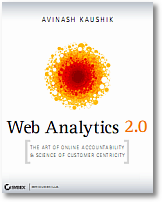




May 4th, 2009 at 05:45
"non-pompous-only-theory-gossip blogs that share new methods of thinking"
You can't say that without sharing an OPML file :)
May 4th, 2009 at 06:45
Thank you Avinash, for the time and thoughts, I enjoyed the reading.
p.s: you have several small typo mistakes in the post. and as a token of good will, I share them in this comment.
a double use of a word "they" in the sentence -
"As to they weather they should be disappointed or not,"
and also with:
"which of the above they they are solving"
and there is:
Not its what what you thought.
(feel free to erase the corrections from the comment)
With regards,
Tal
May 4th, 2009 at 07:03
Great post Avinash. I enjoyed the most common business questions we should address as that is usually the hardest part to pull out of the business.
I wanted to follow up on Tal Galiti's question. Now that we know what it takes to be a web analyst; What path would someone have to take to become a web analyst (ninja)? What courses, career path or training would you recommend?
May 4th, 2009 at 10:40
It is brave of you to point out Google Analytics's flaws so openly Avinash, I don't think any other web analytics Vendor would have the courage to out their own tool.
Adds to your credibility a great deal.
Hopefully the GA team will fix this asap.
Simon.
May 4th, 2009 at 12:45
I think you made a mistake, or just a confusing example, in the Jennifer example explaining Visits to Purchase from Last Campaign.
Jennifer's path is: Paid search visit. Direct visit. Organic visit. Bookmark visit. Direct visit. Direct visit -> Purchase.
And you write that the report will show 3 visits to purchase which is a bookmark visit. Please correct me if I'm wrong, but bookmark visit = direct visit = 6 visits to purchase in the report.
If, by bookmark visit, you mean a visit from online bookmarking site where you tagged the bookmark with campaign variables before Jennifer added the bookmark, then I see how you get the bookmark visit to change the report to 3 visits to purchase. But, if this is the case, your example is a little confusing.
Thanks for clarifying.
May 4th, 2009 at 13:49
Very interesting post with lot of great Q&A.
The first question about Twitter causing increase in overall bounce rate motivated me to quickly point out that if you are still looking at your total site bounce rate then its a crime.
Avinash mentioned long time ago and I completely agree that bounce rate is the coolest metric only when you squeeze out the segment level data. Twitter can certainly cause significant impact on your overall bounce rate but if you segment your bounce reports based on channel, keywords, pages,referring domains and campaigns then you will have meaningful reports to draw actionable insights. Here is a great post by Avinash on this
http://www.kaushik.net/avinash/2007/08/standard-metrics-revisited-3-bounce-rate.html
May 4th, 2009 at 14:45
Excellent Post Avinash with lots of useful info.
On the forecasting, two things I have learned is that (a)it should be actionable (as you mention in your post) and (b) it is always better to keep things simple if the results are not that dissimilar (also helps in explaining to the HIPPOS and C's).
I am not suggesting that this is the case, but it is possible that the results from the 'Holt-Winter' is not that different from just using a 'day-of-the-week' trend (predicting this Monday based on previous Monday's). If that is the case for your business, then use this — will save you the trouble of explaining terms like level, trend, seasonality etc.
May 4th, 2009 at 19:19
Avinash,
You mention that a high EQ is required of your analysts (from your response to question #4). I'm right there with you. It doesn't hurt to have those in the group that can get a sense for the situation and move everyone forward.
Plus, a little intuition and sensitivity can come in handy when you're helping your HiPPO get "over himself," as you state in the second part of your response to question #2.
Good stuff!
-Josh Braaten
PS Thanks for solving the mystery on visits to purchase :D
May 4th, 2009 at 22:25
Sabine: You are going to get me into trouble! :)
Tal: Thanks very much for pointing out the typos, all fixed now.
Sandra: It takes a lot of practice and it takes, really, spending time with Marketers understand their world.
There are courses available from:
University of California Irvine
University of British Columbia
It is tough for Universities to keep the course most current in a world that is changing at hyper speed. Hence now there are Certification programs from industry associations (SEMPO) and private organizations (Market Motive – my startup). Both these options tend to be a lot more current.
But you can't forget blogs, which are a lot lot more current than the industry and private organizations. Be curious, have a good BS filter, read a lot.
PS: Here's a post you might like: How Should Web Analysts Spend Their Day?
Damon: The bookmark and direct are both treated the same by GA (as "direct"). In as much the visits post campaign are computed as illustrated in the three scenarios.
Simon, Josh: You are welcome!
-Avinash.
May 5th, 2009 at 02:52
Although the post is a little big :)I enjoyed it a lot.
Just one thing about de first question. I don´t like at all when people use their twitter to promote their blogs.When that happens, I feel like if i were bombarded with blinkin' banners.
May 5th, 2009 at 05:05
[...] Dear Avinash: Web Metrics & Analytics Questions, Facebook Edition (Occam's Razor by Avinash Kaushik) [...]
May 5th, 2009 at 07:57
Hi Avinash,
Thank you for demystifying the visits to purchase report, a great mystery is solved.
Can we assume that looking at the Loyalty report with an Advanced Segment for visits with purchase conversions would give us what we expect from the Visits to Purchase report?
-Paul
May 5th, 2009 at 12:28
Avinash –
Please share a few of your top "non-pompous-only-theory-gossip blogs that share new methods of thinking" with us!
May 5th, 2009 at 12:38
Hi Avinash,
Thank you for such a detailed post. I was wondering if you can still elaborate on the different scenarios you used in reply to #5. Similar to another poster, Damon, I'm hung up on how "Visits to Purchase from the last Campaign" is being calculated. In my mind, I am looking at them as such (bracket indicating number of visits up to that point) ..
Angie:
Visit from paid search campaign. Direct Visit. [1] Visit from email campaign -> Purchase.
Jennifer:
Paid search visit. Direct visit. Organic visit. [1] Bookmark visit. [2] Direct visit. [3] Direct visit -> Purchase.
Judith
[1] Affiliate visit. [2] Direct visit. [3] Bookmark visit. [4] Direct visit -> Purchase.
But if Bookmark visit is a direct visit, shouldn't GA count Jennifer's visits as …
Paid search visit. Direct visit. [1] Organic visit. [2] Bookmark visit. [3] Direct visit. [4] Direct visit -> Purchase.
Or did you mean GA is counting the sequence of Bookmark and Direct visit as the same, such as …
Paid search visit. Direct visit. [1] Organic visit. [2] Bookmark visit. [2] Direct visit. [3] Direct visit -> Purchase.
Thanks again for the great blog, I hope my question made sense… :)
May 5th, 2009 at 12:46
Hi Avinash: Thanks for your reply.
What a cool way I found your post. I was working in the GAAC group reading about another related topic and someone jumped in with the answer.
" Hi all!!!
I have two news, one good and one bad…
The good one:
I'm happy to announce that Avinash has answered this discussion in his last post."
So I follow the link to this page and begin reading the post. BANG- Avinash has answered my question posted on Facebook :-).
Thanks for the info Avinash- very helpful…a great birthday gift for me!
Cheers,
Rob
May 5th, 2009 at 14:50
Avinash, let me add my thanks for covering the Visits to Purchase report issue. This has been addressed in the GA groups but never properly answered!
Here's hoping that this can be changed (rather than renamed) to provide the level of data that we require to pattern correctly e.g. for drip marketing recommendations.
May 6th, 2009 at 09:55
I liked the variety in the post, and was particularly pulled in because I recognized some of the questions from your feed.
May 6th, 2009 at 15:06
I love the list for #3. 1] Increased Revenue. 2] Reduced Costs. 3] Improved Customer Satisfaction/Loyalty…pretty spot on. I'm gonna write that down for clients who don't have a clue where to start.
May 8th, 2009 at 10:21
[...]
Dear Avinash: Web Metrics & Analytics Questions, Facebook Edition
Avinash Kaushik writes:
[...]
May 9th, 2009 at 14:06
What an outstanding post. Great bunch of q&a. One question though which is on my mind, and not quite answered yet on what I've seen on your blog. Is there any hope left for web log analysis tools? Are they a totally dead breed or is there still data that you can get from them that isn't covered by the likes of Google Analytics, Omniture and Webtrends? I wrote a post on it on my blog, but I haven't answered my own question on it yet.
May 11th, 2009 at 05:36
Thanks once again for a superb post! You have been voted the 'Google' of WA (the place to search for web analytics info). Maybe it should be 'Google and Beyond' of WA – we can search your blog and you go beyond that – you take questions and give back superb answers. Thanks again!
May 11th, 2009 at 06:43
Re the visits to purchase – this looks like a great report in a format which could really drive usable insight. One point – might also be handy to have a similar report showing the number of reports/purchases by users BEFORE the campaign visit. This could help show us whether campaigns are driving new visitors/buyers to our site or increasing the visit/purchase frequency of existing users.
May 11th, 2009 at 08:49
I love #2, seems you're taking my side in a friendly argument I had with a comp sci PhD a week or two ago — thanks :)
May 12th, 2009 at 19:54
[...] Dear Avinash: Web Metrics & Analytics Questions, Facebook Edition – Occam's Razor [...]
May 13th, 2009 at 17:51
[...] We respect Avinash Kaushik so much. He influences our approaches and services towards your needs and goals. Here (this Weblink) is why. [...]
May 17th, 2009 at 01:55
[...] Web Metrics & Analytics Questions, Facebook Edition [kaushik.net] [...]
May 18th, 2009 at 03:22
What a fabulous posting. Very interesting and full of very good informations…
May 18th, 2009 at 23:14
Avinash I commend you for your long and useful posts, they take a lot of time but they are appreciated.
I think Twitter would naturally result in a lower bounce rate, simply due to the nature of its users when they are using it. Most Twitter users want to get as much information as fast as possible so the attention span is naturally low. I'll check my web analytics to see how Twitter users compare to others, I just started using it.
May 21st, 2009 at 03:26
This is a refreshing find in the world of constant data bombardment. I like the philosophical / mystical bent on how the individual human mind can make sense (or not) of this world and not feel overwhelmed. I've added your site to the blogs I follow. Nice one…
May 30th, 2009 at 06:25
Thank you very much for this great post.
I have similar questions as Mark said in his comments, we are still confused by the logic how GA count "visits before purchase". Would you please answer his questions? Thank you very much.
May 30th, 2009 at 22:16
Mars: Lets try explaining Visits to Purchase again, fresh start. :)
Background: Analytics treats any visit except direct and bookmark as a "campaign". So email, affiliate, organic search, banner ads and more are all considered campaigns.
Scenario 1: Affiliate Visit, Direct Visit -> Purchase
Visits to Purchase: 2.
Scenario 2: Affiliate Visit, Bookmark Visit, Direct Visit -> Purchase
Visits to Purchase: 3.
Scenario 3: Affiliate Visit, Bookmark Visit, Direct Visit, Email Visit -> Purchase
Visits to Purchase: 1.
Scenario 4: Affiliate Visit, Bookmark Visit, Direct Visit, Email Visit, Direct Visit -> Purchase
Visits to Purchase: 2.
Scenario 5: Affiliate Visit, Bookmark Visit, Direct Visit, Email Visit, Direct Visit, Organic Search Visit, Direct Visit, Direct Visit -> Purchase
Visits to Purchase: 3.
Is it more clear now?
-Avinash.
June 1st, 2009 at 05:25
Avinash,
I have a solution to the Visits to Purchase/Days to Purchase issue via a profile that preserves the initial referrer. The issue came up just recently in the comments of my post on the initial referrer profile and I was glad to be able to point back to your post on this as an explanation.
September 1st, 2009 at 15:11
Very Good. Now i know what i can do in future…
September 29th, 2009 at 22:53
Hi Avinash
The pics in your site are always interesting and relevant. Where do you get them from? Are these paid or free?
Also is there any article on your site related to analytics for facebook
Thanks
Vivek
November 14th, 2009 at 10:23
[...] Dear Avinash: Web Metrics & Analytics Questions, Facebook Edition – Occam’s Razor – May ‘09 [...]